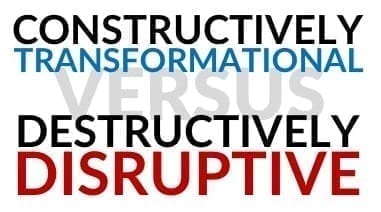Legal Operations Automation: Are You Leading or Left Behind?
Automation is coming to the legal profession. It’s inevitable. So legal operations automation can be either constructively transformational or destructively disruptive – and the difference relies on whether that evolution is embraced or resisted.
As Law.com notes in a recent review of developments on the legal employment front, there are those who are worried about getting out in front of the changes automation will create in the legal workplace. At the same time, there are others who are already taking aggressive steps to capitalize on the new tools and the opportunities they offer.

“We need to take responsibility. We can’t wait for the government or businesses to take on this issue,” Michael Lotito of Littler Mendelson explains in the article. “These are significant workplace issues of our time and it needs to be looked at with vigor.”
As a law firm focused on employment law, Littler is deeply engaged with these issues, and have just issued a report on the “technology-induced shockwaves” hitting workplaces. Those workplaces will probably include legal departments and law firms, but will automation and digital transformation really impact job counts?
A shifting landscape in the legal workplace
That erosion began long before options like legal operations automation showed up. From 2005 to 2015, U.S. law school applications fell by roughly 40% according to the American Bar Association. The job market for lawyers had already been tightening, due to a number of factors like outsourcing and nontraditional resources. Now, though, corporate legal workloads are on the rise, but companies aren’t springing for more attorney hires as much as they’re looking to new options like flexible billing arrangements with outside counsel, and, yes, legal operations automation.
There’s plenty of headroom for improvement. One recent survey found that fewer than 47% of Legal Operations professionals felt their outside law firms were leveraging technology to deliver legal services more cost-effectively and efficiently. Just as noteworthy? Over 30% of responding companies hadn’t instituted any form of legal project management, a backbone of effective Legal Ops.
How legal operations automation will help true leaders lead
While there are laggards, the flip side of the coin is that many firms and Legal Ops teams are adopting Legal Operations automation solutions, and then running – fast and far ahead – with what those tools can do.
From accelerating workaday legal processes by evolving them from high-touch to high tech, and leveraging analytics to drive cost management forward, the pioneers may have blazed the way, but plenty of others have already followed in their wake and adopted proven, peer-tested platforms and solutions.
The value of Legal Operations automation doesn’t fall simply to the bottom line, either. As the case studies show, the performance benchmarks these solutions deliver can make the legal department a beacon of efficiency and innovation for the rest of the business. Which ends up making them more central to strategy and operations throughout the enterprise.
The speed at which tech-driven transformation is coming to the legal industry will, inevitably, drive exactly the same kind of shakeout that’s happened in every other sector where newer, smarter ways of doing things have taken hold:
- Innovators and later adopters who commit to transformation reap the rewards.
- Reluctant, stuck-in-the-past traditionalists wither into being extremely “boutique” providers or perish altogether.
Prepping for the next frontier
It’s certain that Legal Operations automation can help legal teams prep meet today’s challenges while preparing them for a transformed tomorrow. Part of that evolution? It’s planning how to best utilize the human assets who are at the core of legal practice.
Legal educators are pointing out how a legal profession where manual processes are extinct, and technology is central, will require legal professionals who are educated in how to work with these tools.
Many of the solutions already at hand are easy to afford, learn and deploy, so much so there’s hardly any excuse for not adopting them. But it’s up to resistant law firms and legal departments to take that step forward. And for traditionalists to admit there’s a change underway in the first place.
Technological change can propel any business toward leadership and competitiveness, or into becoming a musty relic. What makes the difference? A willingness to evolve. Ten years from now, which side will you be sitting on?
“What’s dangerous is not to evolve.”
Jeff Bezos



